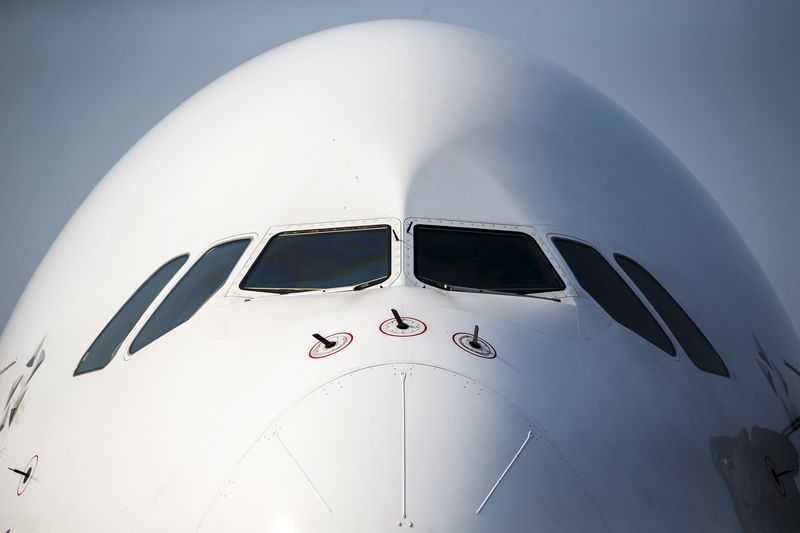This post was originally published on this site
https://i-invdn-com.investing.com/trkd-images/LYNXNPEI430O3_L.jpg
DUBLIN/PARIS (Reuters) -Airbus on Wednesday firmed up record plans for a 50% hike in key narrowbody jet output as it gambles on a steady travel rebound led by the United States, where the European exporter plans to deepen its industrial footprint.
The world’s largest planemaker reaffirmed existing plans to raise A320-family production to 65 jets a month in mid-2023 and confirmed tentative plans to go further by lifting monthly output to 75 in 2025, compared with around 50 a month now.
Coming alongside a higher than expected first-quarter profit, the move highlights a powerful recovery for the industry’s most-sold category of jet, which has propelled Airbus ahead of Boeing (NYSE:BA) – still emerging from a crisis over the 737 MAX.
The decision will lead to a second A320-family assembly line in Mobile, Alabama, increasing the European manufacturer’s presence in arch-rival Boeing’s backyard. So far, Airbus has nine current or planned lines in Europe, the U.S. and China.
U.S. airlines have ordered hundreds of Airbus single-aisle jets, while also placing recent large orders for the MAX.
Chief Executive Guillaume Faury, who spearheaded an Airbus restructuring involving thousands of job cuts when the pandemic hit two years ago, stressed significant work would remain in Europe, where Airbus will continue to build the main parts.
“We can go faster in Mobile and will be gaining critical mass,” he told reporters, adding “It will benefit the whole ecosystem of Airbus and benefit all our sites.”
BOTTLENECKS
Making France more competitive internationally is one of the core promises of reformist President Emmanuel Macron who pledged to “re-industrialise” the country ahead of his re-election in April.
Although unemployment is at its lowest in years, investment remains in focus as his party heads into parliamentary elections in June.
Like many industrial groups, Airbus sees growing short-term risks in its supply chain but it voiced confidence that a global network of suppliers will be able to keep up.
Some experts fear widespread shortages will disrupt higher output in the short term, while industry bankers gathering for annual conferences in Dublin are worried that high production could also depress existing assets.
“There’s going to be acute bottlenecks all the way down the supply chain from engines down to the lowly widget makers,” said former leasing executive Dick Forsberg, senior adviser at PWC.
Another senior air finance expert, former banker Bertrand Grabowski, contrasted the new target with current output delays.
“Many clients will be surprised when today Airbus is unable to deliver a significant portion of orders on time,” he said.
Airbus said its benchmark adjusted operating profit rose 82% to 1.26 billion euros in the first quarter on the back of higher deliveries and a one-off pension gain, offset by the impact of sanctions against Russia over war in Ukraine.
Jefferies analyst Chloe Lemarie said the underlying figure was 20% ahead of market estimates with contributions from all divisions which include Defence & Space and Helicopters.
Revenue rose 15% to 12 billion euros as Airbus also left its financial targets for the year unchanged.
It meanwhile confirmed a delay in its newest jet, the A321XLR, to early 2024 amid talks with regulators.

